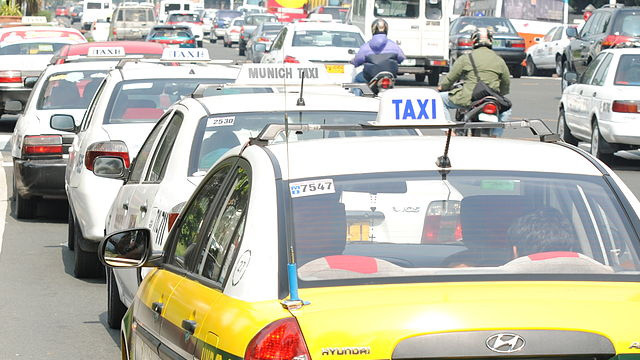
MANILA, Philippines – Following the implementation of the Anti-Distracted Driving Act, drivers of private and public utility vehicles now have until Friday, May 26, to clear their dashboards of figurines, toys, and other unauthorized car accessories.
Land Transportation Franchising and Regulatory Board (LTFRB) member Aileen Lizada said in a dzMM interview on Sunday, May 21, that rosaries hanging under rearview mirrors, small images of saints, and stuffed toys on the dashboard that can affect the driver's line of sight are prohibited.
Motorists are also banned from eating, drinking, or putting on makeup while on the road, even while temporarily stopped.
Lizada said these unauthorized car accessories and acts are prohibited under the transportation department's 2014 Joint Administrative Order (JAO).
"Dito nahuhulog 'yung kung umiinom kayo ng kape, o girls na nagme-makeup o kumakain. Dito siya under sa reckless driving. 'No person shall operate a motor vehicle on any highway recklessly,'" she said.
(Acts like drinking coffee, putting on makeup, or eating fall under this JAO. It's under reckless driving. "No person shall operate a motor vehicle on any highway recklessly.")
"Other non-electronic [items] that aren't covered under the Anti-Distracted Driving Act, it's under the JAO," she added in Filipino.
Under the reckless driving offense, violators face a penalty of P2,000 for the first offense, P3,000 for the second offense and a 3-month suspension of the driver's license, and P10,000 for subsequent offenses plus a 6-month suspension of the license.
Meanwhile, Lizada said toys and other car accessories are considered "unauthorized accessories, devices, equipment, and parts."
"[These include] bells/horns/sirens/whistles, blinkers, brakes, early warning device (EWD), grill/s, jalousies, brake (foot and hand brakes), brake lights/headlights/interior lights/signal lights/tail lights, mirrors, mufflers, metallic tires/spare tire, speedometer, windshield, wipers or any other accessory, device, equipment or part that is manifestly prejudicial to road safety," the JAO read.
Violators face a P5,000 penalty and the vehicle will be impounded unless the accessory is removed.
Reactions, criticism
The transportation department and its attached agencies have been drawing questions and criticism online over the implementation of the Anti-Distracted Driving Act. (READ: What you need to know about the Anti-Distracted Driving Act)
Social media users questioned why gadgets are not allowed to be placed on the vehicle's dashboard supposedly to avoid blocking the line of sight, while signboards on public utility vehicles like buses and jeeps are still allowed.
Lizada said the LTFRB is working on guidelines specifying where it would be safe to put these signboards.
"What we do not like is one where you have a blind spot, [where there are a lot of] gadgets or accessories on top of the dashboard. The guidance that was given to us is that the line of sight must be cleared," she said.
The ban on the religious icons and trinkets – which visitors to the Philippines inevitably see hanging off rearview mirrors in taxis and jeepneys – has stirred the most controversy, especially from the Catholic Church which insists they offer divine intervention on the nation's chaotic roads.
Roughly 80% of the Philippines' 100 million people are Catholic, a legacy of centuries of Spanish colonial rule that ended in 1898, and the religious icons in vehicles are seen by many as offering God's protection while driving.
"This is an overreaction, insensitive and lacks common sense," Father Jerome Secillano, executive secretary for public affairs at the Catholic Bishops' Conference of the Philippines, told Agence France-Presse.
"With these religious images, drivers feel they are safer, that there is divine intervention and they are being guided and protected."
Piston, an association of jeepney drivers and owners, also criticized the plan, saying there was no data showing rosaries and religious trinkets caused accidents.
"Do not meddle with the drivers' faith in God," Piston president George San Mateo told Agence France-Presse. – with reports from Agence France-Presse/Rappler.com